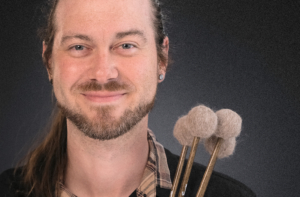Star-Crossed Lovers
November 4, 2024
By Hannah Schedel, Music Director
“Star-crossed lovers” is a term which is often quoted, but one that merits a closer examination. This phrase refers to lovers whose fate is determined by the stars, a concept rooted in the astrological belief that celestial bodies have the ability to shape human destinies. In the realm of classical music, many compositions explore emotional turmoil that resonates with all of us. On this program, we explore three remarkable works: Richard Wagner’s Die Meistersinger von Nürnberg, Emmanuel Séjourné’s Concerto for Marimba and Strings, and Sergei Prokofiev’s Romeo and Juliet Suite No. 2. Each piece offers a unique insight into the composers’ artistic imagination and the emotions they aim to evoke.
Please join us for this concert at Eisenhower Community Center in Hopkins on November 17, 2024 at 3:00 pm. Note the new venue! Details can be found here.
Prelude to Die Meistersinger von Nürnberg by Richard Wagner
Die Meistersinger von Nürnberg (The Mastersingers of Nuremberg), Wagner’s only comedic opera, stands out not only for its humor but also for its historical setting, diverging from the mythical realms typical of Wagner’s other operas. Composed over twenty-two years, the opera premiered in Leipzig in 1862. Set in sixteenth-century Nuremberg, it depicts a complicated love story between Walther and Eva, as Eva must marry the winner of a singing contest organized by the Mastersingers—a guild of amateur musicians and poets.
With the guidance of Hans Sachs, the most esteemed mastersinger, Walther learns to sing the night before the contest, and ultimately triumphs. This victory allows him not only to join the guild but also to marry Eva, creating a narrative that celebrates love, artistry, and community.
Concerto for Marimba and Strings by Emmanuel Séjourné
Kelly Grill, Marimba
The next piece, Concerto for Marimba and Strings was composed by French composer Emmanuel Séjourné who currently teaches at the Strasbourg Conservatory, Séjourné is celebrated for his innovative compositions for keyboard percussion, particularly the marimba and vibraphone. His works often blend classical traditions with jazz, rock, and world music styles.
Commissioned by marimba virtuoso Bogdan Bácanu, the concerto has seen over 500 performances since its premiere in 2006. Originally comprised of just two movements—“Tempo souple” and “Rhythmique énergique”—the piece highlights the marimba’s versatility. The second movement, with its intricate rhythms reminiscent of Spanish flamenco, showcases challenging passages in an 11/8 meter, allowing the soloist to explore the instrument’s emotional depth and technical brilliance. This lively work invites listeners to appreciate the marimba as both a lyrical and virtuosic instrument.
Romeo and Juliet Suite No. 2 by Sergei Prokofiev
No exploration of a love story in music would be complete without Sergei Prokofiev’s Romeo and Juliet. Composed as a ballet in 1935, Prokofiev later extracted movements to create three orchestral suites that illuminate Shakespeare’s tragic tale.
The suite begins with the “Montagues and Capulets,” in which the “Dance of the Knights” sets the tone for the tension felt between the feuding families. This is followed by “Juliet – The Young Girl,” which captures the youthful spirit of Juliet, and “Friar Lawrence,” which portrays the well-meaning priest. As the suite unfolds, listeners experience the intimate moments between Romeo and Juliet, culminating in the heart wrenching “Romeo at Juliet’s Grave.” This movement evokes the deep sorrow felt as Romeo, unaware of Juliet’s feigned death, takes his own life in despair, only to have her awaken moments later.
Each of these works offers a distinct perspective on love, artistry, and the human experience. Wagner’s playful yet profound opera, Séjourné’s vibrant and captivating marimba concerto, and Prokofiev’s poignant ballet suite together create a rich tapestry of musical expression. As we immerse ourselves in these compositions, we are reminded of the power of music to tell stories that resonate across time and culture. As we immerse ourselves in these compositions, we are reminded of music’s power to tell stories that resonate across time and culture. Whether through Wagner’s storytelling, Séjourné’s rhythmic innovations, or Prokofiev’s tragic beauty, each piece invites us to explore the depths of emotion and creativity found in both the world and in classical music. I’d love to see you in the audience on November 17!

